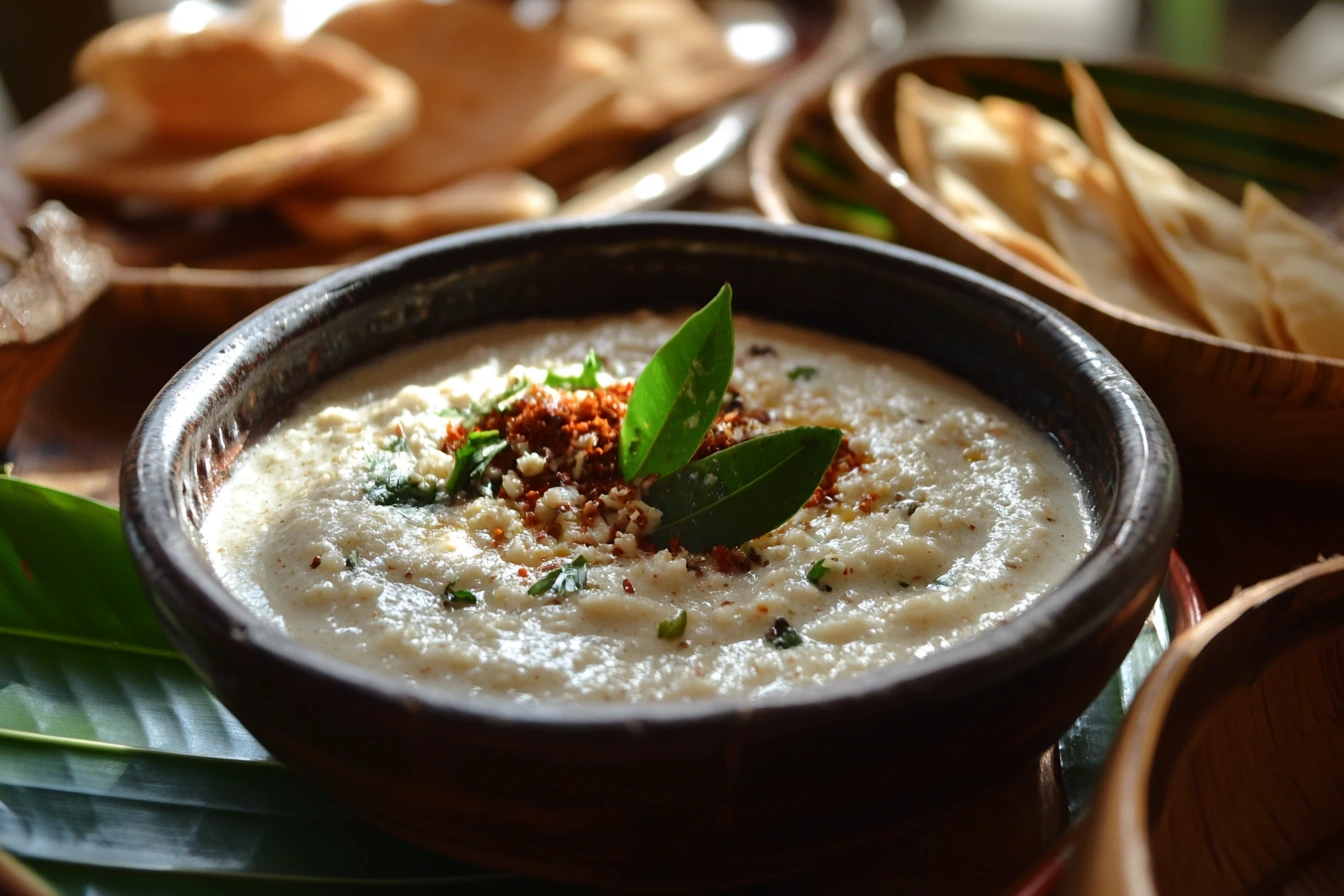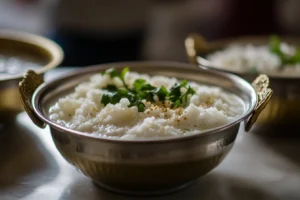Introduction
Coconut chutney is a popular condiment in South Indian cuisine, known for its rich flavor, smooth texture, and aromatic spices. Beyond its delicious taste, coconut chutney is packed with essential nutrients that promote overall health. Made from fresh coconut, herbs, and spices, it is not only flavorful but also nutritionally beneficial.
However, many people wonder: Is coconut chutney good for health? The answer lies in its natural ingredients, healthy fats, and nutritional composition. Coconut chutney contains dietary fiber, healthy fats, and vitamins that support heart health, digestion, and energy metabolism.
Additionally, it is gluten-free, vegan, and vegetarian, making it suitable for a variety of diets. With moderation and the right preparation methods, coconut chutney can be a healthy addition to your diet.
Nutritional Value of Coconut Chutney
The nutritional value of coconut chutney comes from its core ingredients, each offering essential nutrients.
Nutritional Breakdown (Per 100g):
- Calories: 150-200 kcal (varies based on ingredients)
- Healthy Fats: 13-16g (mainly medium-chain triglycerides)
- Carbohydrates: 7-9g (natural sugars and dietary fiber)
- Proteins: 2-3g (plant-based proteins)
- Vitamins & Minerals: Contains vitamin C, vitamin E, potassium, magnesium, and iron.
Key Nutritional Benefits:
- Fresh Coconut: Rich in fiber, healthy fats, and antioxidants.
- Green Chilies: Boost metabolism and provide vitamin C.
- Curry Leaves: Aid digestion and improve skin health.
- Mustard Seeds: Support heart health with anti-inflammatory properties.
- Garlic & Ginger: Boost immunity and reduce inflammation.
Additionally, coconut chutney is low in cholesterol, gluten-free, and loaded with antioxidants, making it a nutritional powerhouse.
For more nutritional insights, visit What Is Coconut Chutney Made Of?.
Health Benefits of Coconut Chutney
Coconut chutney offers multiple health benefits, thanks to its nutrient-dense ingredients. Here’s how it can improve overall health:
1. Supports Heart Health
- The healthy fats from coconut contain medium-chain triglycerides (MCTs), which are good for heart health.
- Mustard seeds and garlic lower cholesterol levels and support cardiac health.
2. Promotes Digestive Health
- Dietary fiber from coconut aids in better digestion and prevents constipation.
- Curry leaves and cumin seeds enhance gut health.
3. Strengthens the Immune System
- Garlic and green chilies boost immunity due to their antibacterial and antiviral properties.
- Vitamin C from chilies strengthens immune defenses.
4. Supports Weight Management
- Coconut chutney is low in carbs and contains healthy fats, promoting fullness and helping manage appetite.
5. Provides Antioxidant Protection
- Antioxidants from coconut, herbs, and spices fight free radicals and reduce inflammation.
6. Maintains Skin & Hair Health
- Vitamin E and essential oils in coconut improve skin elasticity and hair strength.
Additionally, incorporating coconut chutney into your diet can enhance meal variety while boosting nutrition.
How to Make Coconut Chutney Healthier
While coconut chutney is naturally nutritious, you can make it even healthier with a few simple tweaks:
1. Choose Fresh Ingredients
- Use fresh coconut, herbs, and spices for maximum nutritional value.
- Avoid preservatives or store-bought chutneys.
2. Add Superfoods
- Add Nuts: Use almonds or cashews for extra protein and healthy fats.
- Include Seeds: Add flaxseeds or chia seeds for added fiber and omega-3s.
3. Use Less Oil
- Use minimal oil for tempering to reduce calorie intake.
- Choose heart-healthy oils like olive oil or coconut oil.
4. Adjust the Spice Level
- Add spices like turmeric, ginger, and coriander to boost anti-inflammatory properties.
5. Control the Salt
- Use low-sodium salt or Himalayan pink salt for a heart-healthy version.
6. Add a Protein Boost
- Add yogurt or roasted chickpeas for a protein-rich chutney.
Additionally, make small batch portions to keep the chutney fresh and nutritious.
Internal Linking Suggestions:
- What Is Coconut Chutney Made Of? – Key ingredients for a healthy chutney.
- Coconut Chutney Recipe – Step-by-step preparation guide.
- Why Does Coconut Chutney Curdle? – Troubleshooting preparation issues.
Potential Health Concerns of Coconut Chutney
While coconut chutney is generally healthy, it can pose potential health concerns when consumed in large amounts or improperly prepared. Here are some common risks to watch out for:
High-Calorie Content
- Coconut is naturally high in calories and saturated fats. Overeating can lead to weight gain if not balanced with other foods.
- Tip: Control portion sizes to avoid excess calorie intake.
High Sodium Levels
- Adding too much salt can lead to high blood pressure and water retention.
- Tip: Use low-sodium salt or salt substitutes to keep the chutney heart-friendly.
Short Shelf Life
- Due to its fresh ingredients, coconut chutney spoils quickly.
- Tip: Refrigerate immediately after preparation and consume within 2-3 days.
Allergies
- Some individuals may be allergic to coconut, nuts, or spices.
- Tip: Avoid ingredients that may trigger allergic reactions.
Oil Overload
- Using too much oil during tempering can increase fat content.
- Tip: Use minimal oil and heart-healthy options like coconut oil or olive oil.
Additionally, maintaining balanced portions and modifying the recipe can help you enjoy coconut chutney without compromising health goals.
Best Preparation Practices for a Healthy Coconut Chutney
To ensure that coconut chutney remains nutritious and health-friendly, follow these best preparation practices:
Use Fresh Ingredients
- Always choose fresh coconut, spices, and herbs to maximize nutritional value and enhance flavor.
- Avoid: Pre-packaged mixes with preservatives or artificial additives.
Reduce Oil Usage
- Use only 1-2 teaspoons of oil for tempering to keep the chutney low in calories.
- Consider: Air-frying or dry-roasting spices to reduce oil intake while preserving aroma.
Add Nutrient Boosters
- Seeds: Add flaxseeds or chia seeds for fiber, protein, and omega-3 fatty acids.
- Nuts: Blend almonds, cashews, or walnuts for healthy fats and a creamier texture.
Balance the Spices
To make coconut chutney more health-supportive, consider balancing the spices with anti-inflammatory options:
- Turmeric: Known for its powerful anti-inflammatory properties and immune-boosting effects.
- Ginger: Helps with digestion and reduces inflammation.
- Coriander: Supports detoxification and improves gut health.
Tip: Additionally, adjust spice levels based on your taste preferences to create a chutney that’s flavorful yet nutritious.
Choose Healthier Alternatives
Making healthier swaps can lighten coconut chutney while enhancing its nutritional profile:
- Low-Fat Yogurt: Use low-fat yogurt instead of coconut milk for a lighter, protein-rich version.
- Low-Sodium Salt: Choose Himalayan pink salt or sea salt to help maintain heart health and regulate fluid balance.
Practice Portion Control
Best Practices for Keeping Coconut Chutney Fresh and Nutritious
To maintain the freshness, flavor, and nutritional value of coconut chutney, follow these essential storage tips:
Make Small Batches
- Additionally, prepare smaller portions of coconut chutney to avoid leftovers and reduce waste.
- This ensures the chutney stays fresh and flavorful when served.
- Tip: Make enough for 2-3 servings and prepare a fresh batch when needed.
Store Properly
- Use airtight containers made of glass or food-safe plastic to preserve freshness.
- Refrigerate Immediately: Place the chutney in the refrigerator within 2 hours of preparation to prevent spoilage.
- Additionally, avoid storing it near strong-smelling foods to maintain its natural aroma.
By following these storage practices, you can extend the shelf life of coconut chutney while preserving its taste and nutritional benefits. Enjoy fresh chutney in your meals while minimizing food waste and health risks.
FAQs About Coconut Chutney and Health
Can Coconut Chutney Help with Weight Loss?
Yes, when consumed in moderation, its healthy fats and dietary fiber can help manage appetite and reduce hunger cravings. The medium-chain triglycerides (MCTs) in coconut provide long-lasting energy, making it a great choice for those following a balanced diet.
Is Coconut Chutney Good for the Heart?
Yes, medium-chain triglycerides (MCTs) in coconut support heart health. Use minimal oil and less salt for an even healthier version.
Can Coconut Chutney Cause Weight Gain?
Yes, overconsumption can cause weight gain due to its high calorie and fat content. Practice portion control.
Is Coconut Chutney Safe for Diabetics?
Yes, it’s low in carbs and high in fiber, making it diabetes-friendly when prepared with less sugar and moderate salt.
How Long Can Coconut Chutney Be Stored?
Store in the refrigerator for 2-3 days in an airtight container. For longer storage, freeze in small portions.
For more tips, check What Is Coconut Chutney Made Of?.
Conclusion
In conclusion, coconut chutney is a flavorful, nutrient-rich condiment that can be a valuable addition to a balanced diet when prepared mindfully. Its natural ingredients, such as fresh coconut, herbs, and spices, offer essential vitamins, minerals, and healthy fats that promote heart health, better digestion, and immune support.
However, it is important to practice portion control due to its high calorie content. Reducing salt, using minimal oil, and avoiding preservatives can further enhance its health benefits. Additionally, experimenting with custom recipes by adding nuts, seeds, and low-fat yogurt can transform coconut chutney into a superfood condiment.
Moreover, its versatility makes it suitable for both traditional Indian meals like dosa, idli, and vada, as well as modern dishes like wraps, salads, and sandwiches. By storing it properly and using fresh ingredients, you can ensure that your coconut chutney stays fresh, tasty, and nutritionally balanced.
Finally, coconut chutney is more than just a delicious dip. It is a nutritious, adaptable, and health-supporting food that can enhance meals and support a healthier lifestyle. Enjoy its rich flavor while making it part of your everyday diet.
Internal Linking Suggestions:
- Coconut Chutney Recipe – Preparation guide.
- What Is Coconut Chutney Made Of? – Ingredient insights.
- Why Does Coconut Chutney Curdle? – Troubleshooting preparation issues.



